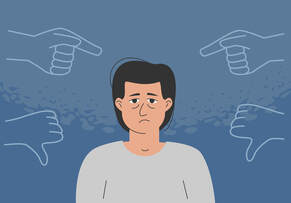Less Listening, More TalkingWritten By Adam Ginsburg, MA, LPC Okay, shut it down! Show’s legitimately over before it even began, as we haven’t even started rolling the trailer footage on things and yet you read the topic of this blog post and we’ve already spiraled beyond our means. Extraverts everywhere are shouting from the top of their already warmed up vocal cords, “SEE!! I WAS RIGHT ALL ALONG!!” Well...sorta.
It’s likely that at some point in our lives, the sage wisdom has been spoken over us, irony of all ironies I suppose, that if we really want to better understand something or someone, it would be of great assistance to us if we talked less and listened more. Yet, here we are with the suggestion of doing the opposite: listening less, talking more. All of this on a day that hasn’t been officially proclaimed as opposite day too? Well yeah, and there’s no such thing as opposite day to begin with, so sorry for super raining on this parade even further. Here’s what I’m getting at. A lot of the troubles we experience when it comes to our mental health and mental vitality emerge when we find ourselves in a place where we’re listening to ourselves rather than talking to ourselves. I get it, both sound increasingly weird in concept and perhaps even illuminate further the inescapable nature that as people, we’re awfully complicated individuals since we’re apparently both listening to and talking to ourselves with some semblance of frequency. There’s truth in this, however. According to a research study conducted in 2020 (blast you, 2020 and your COVID-19 ways!) by psychologists at Queens University, an average person experiences around 6,200 thoughts per day. Wait...whut? Yeppers. 6,200 thoughts each day. So there’s a lot of thinking going on, and for most of us, a good majority of these thoughts aren’t being actively expressed so they exist internally only, unless of course you’ve made a habit of narrating your daily activities as you do them, “So I’m going to take out the garbage and wait a minute...did Samantha just get a fresh cut and purchase a new Buick?” So with 6,200 thoughts a day, the bulk of which remain internal, that feels like an awful lot of listening to ourselves, perhaps to an exhausting degree, right? This is to say nothing of the nature of our thoughts as well. Catch me on a bad day and woof friends, it’s a miracle I have any social contacts based on the negativity and harshness some of my thoughts express. I feel like I’m not alone in this sentiment but you know what? Totally okay if I am as we as counselors anticipate vulnerability from clients, so the least I could do is go first with presenting my own. With such negativity often occurring, it’s commonplace to get in a pattern of listening to ourselves in a one-sided monologue that serves to increase distress rather than decrease it. The balancing mechanism to this is instead of listening to ourselves, there comes those necessary moments where we’d be wise to start talking to ourselves. Talking to ourselves as in, expressing to ourselves the expectations, hopes, ambitions and aspirations we have for the course and content of our lives. After all, worry emerges from listening to the restlessness of our thoughts whereas peace comes from speaking to our thoughts. Mind you, this isn’t interpreting peace as the absence of conflict as much as the ease of simply being. That’s really something to unfurl for another time and place. Simple question to ponder over: are you listening to yourself more than you’re talking to yourself? As Dr. Phil once shouted...okay, multiple times shouted repeatedly...“How’s that working for you?” Perhaps it’s overdue to lessen some of the volume and distress that occurs with listening to yourself and more actively engage in talking to yourself to profess more of what you’re actively seeking in your life. Comments are closed.
|
OakHeart
|
- Home
- Counseling
-
Specialties
- Depression
- Bipolar Disorder
- Anxiety Disorders >
- Obsessive-Compulsive Disorder (OCD)
- Eating Disorders
- Grief and Bereavement
- ADHD
- Maternal Mental Health
- Infertility, Miscarriage, and Neonatal Loss
- Domestic Violence and Sexual Assault
- Posttraumatic Stress Disorder (PTSD) >
- Trauma
- Non-Suicidal Self-Injury (NSSI)
- Substance Use Disorders (SUD)
- Anger Management
- Insomnia
- Divorce Recovery
- Relationship Concerns and Couples Counseling
- Self-Esteem
- Therapy for Therapists
- LGBTQA+ Support
- Faith-Based Counseling
-
Providers
- Erin Mitchell
- Pamela Heilman
- Katie Sheehan
- Hillary Gorin
- Lee Ann Heathcoat
- Adam Ginsburg
- Megan Noren
- Sarah Williams
- Christina Bieche
- Bridgette Koukos
- Laura Lahay
- Kate Nash
- Anna Perkowski
- Alma Lazaro
- Leah Arthur
- Marissa Vogrin
- Erin Blair
- Amy Jakobsen
- Lizzy Lowe
- Tony Fasano
- Gerry Lawm
- Vanessa Osmer
- Kat Harris
- Locations
- Contact
- Treatments
- Employment
- FAQ and Notices
- OakHeart Blog
- Administrative and Leadership Team
- Mental Health Resources
- Divorce Mediation
- Professional Consultation
|
|




